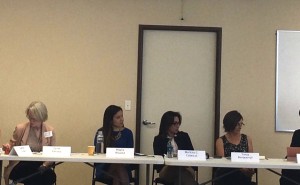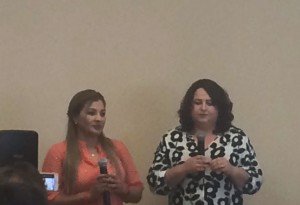Medi-Cal coverage now includes undocumented Calif. kids

Panel of experts explaining the benefits of Californi’s expanded Medi-Cal health coverage, which includes undocumented children, during a New America Media press briefing in Los Angeles. HIYASMIN QUIJANO
LOS ANGELES — All children in California can get health care regardless of immigration status because of a new law, and help is available for parents of children who are not yet enrolled, a panel of experts explained.
Senate Bill (SB) 75, now a law effective since May 1 this year expands Medi-Cal coverage to eligible undocumented children under 19 years of age, extending the full scope of Medi-Cal coverage to over 200,000 kids.
Mayra Alvarez, president of LA Children’s Partnership, explained, “Ninety-seven percent of kids in California have insurance coverage, and the three percent of uninsured equals hundreds of thousands of kids.”
In approximately six months since the law was enacted, 150,000 children have been enrolled. Full-scope coverage includes medical, dental, mental health, vision, alcohol and drug use treatment, and medication.
Article continues after this advertisementArticle continues after this advertisement
Big difference
Immigrant Sukey Ramirez said that the law has made a big difference for her. Among her three children, her six-year-old son, who has a heart condition and needs intense medical services, has received full-scope Medi-Cal coverage because of SB 75.
Ramirez’s son no longer has a lot of his appointments suspended, as occurred before under restricted Medi-Cal coverage. All of Ramirez’s three children now use medical and dental services in Los Angeles County.
However, nearly 12,000 children are still eligible for enrollment in Los Angeles County, but that number might be higher since the undocumented rarely participate in data surveys. Panelists said current barriers for those eligible to apply include transportation, language, immigration status, and fear of leaving “a paper trail.”
Another barrier is parents’ lack of knowledge about full-scope Medi-Cal, including when and how they may apply. Eligible participants can apply via phone, online and filling out a print application. “There isn’t an open enrollment period; it is all year long,” Alvarez clarified.
Dental care
Dental care is included in the scope of coverage. Seven out of ten third graders in Los Angeles County have some form of tooth decay. “Dental disease is 100 percent preventable,” said Maritza C. Cabezas. “We have kids afraid to smile because of dental decay.”
Referring to the population of those who are insured, she added, “54.6 percent of children used dental care. Children whose ages range from 0 to 3 account for half of ER visits in LA County.”

Immigrant parent Sukey Ramirez (left) shares the difference between restricted Medi-Cal vs. SB 75 full scope Medi-Cal for her child. HIYASMIN QUIJANO
Herald Christian Health Center’s Dental Director Jerry Tzou said many of his patients are immigrants, with 95 percent of them from China or another country in Asia. However, the dental patients’ degree of dental literacy can vary—many make an appointment only when pain is involved. Consequently, there is still a great need to educate the community and provide information about access.
Mental health care included
Tania Benacerraf, director of behavioral health and child welfare programs at Hope Street Family Center, stated, “We tend to overlook mental health and needs,” explaining that adults do not always pay attention to mental care.
Although some causes of mental illness are genetic, a lot of cases are related to trauma and exposure to trauma, such as poor attachment to a parent, family violence, community violence, and the immigration process. “Oftentimes, children are coming after years of separation from their parents,” added Benacerraf. “All children should have access to mental health care.”
“Health care is a right for children,” said co-moderator Lynn Kersey, executive director of MCHA.
New America Media (NAM) and Maternal & Child Health Access (MCHA) hosted the news briefing “Six-Month Check Up—Medi-Cal Expansion Aims to Cover All Kids. How Are We Doing?”
On the panel were Lynn Kersey, executive director of MCHA, and Sandy Close, executive director of NAM, Mayra Alvarez,; Maritza C. Cabezas, DDS, MPH, director Oral Health Program, LA County Dept. of Public Health; Nancy Hieu Nguyen, PhD, LMFT, child psychologist, Western Youth Services; Tania Benacerraf, Director Of Behavioral Health, Hope Street Family Center; Dr. Jerry Tzou, director, Herald Christian Health Center and parents.
To learn more about SB 75 and Medi-Cal, go to www.dhcs.ca.gov.